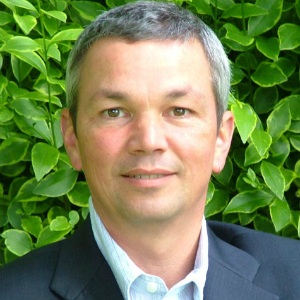 Career progression
Career progression
1. BSc (Hons) Pharmacology
2. Preclinical Project Leader (Industry)
3. Head of Pharmacology (Industry)
4. Senior Lecturer/Consultant
Mark is a Senior Lecturer at King's College London, as well as a Consultant
What is your career pathway to date (including your education)?
I left school with A Levels in physics, chemistry and biology and studied at the Welsh National School of Medicine, before transferring to pharmacology in year three. I graduated with a BSc (Hons) pharmacology in 1985 and stayed in Cardiff to complete my British Heart Foundation sponsored PhD in 1988.
My first job was with Fisons, running animal models of cardiovascular function for dopamine agonist programs. By 1994, when the R&D site was acquired by Astra, I managed a team of pharmacologists using in vitro and in vivo models to develop chemokine receptor antagonists and by 1998, when Astra and Zeneca merged, I was also a Preclinical Project Leader.
In 2001, I joined Celltech R&D (Cambridge) as Head of Pharmacology, where we developed animal models of Multiple Sclerosis for small molecule and antibody projects. Celltech was acquired by UCB in 2004 and as Deputy Site Director, I coordinated the closure of the Cambridge site in 2008.
In 2009 I set up a consultancy business, Akranim Ltd, which provides preclinical drug discovery expertise to the Pharma & Biotech sectors, and in 2009 I started part-time at King’s College London (KCL) as a BBSRC-funded Industrial Impact Fellow, becoming a Senior Lecturer in 2016.
What do you do? What does a typical week look like to you?
I have a 40% full-time equivalent (two days a week) contract with KCL, and during the first two semesters I commute to the Waterloo or Guy’s campuses to teach Pharmacology, Pharmacokinetics and Drug Discovery. These are all topics with which I am familiar from my time in industry and I enjoy showing students how they can be applied to real-world drug discovery problems. I can work from home too, so assessing coursework, marking exam scripts and preparing teaching material can all be done remotely. Occasionally I travel to meet students who are on their Extra Mural Year in industry to meet with them and their supervisors and discuss progress. Finally, whilst I have experience as a pharmacologist, I am still learning to teach, and I spend some of my time reviewing how best to deliver my teaching in the most effective way.
Consultancy work tends to be less predictable. In the past I have acted as an expert witness, prepared regulatory documents, reviewed new project proposals, advised on in-licensing and out-licensing opportunities, delivered training courses, facilitated meetings and mentored senior staff. Whilst I have had clients who prefer me to be on-site on a regular basis, most work arrives at relatively short notice, is usually high-priority for the client and can require international travel. In most cases, clients contact me because they want me to apply my expertise to their problem, which usually requires intense study and research followed by a meeting, presentation or the generation of a position document. If I feel my expertise is not relevant, then I can usually make an introduction to a third party by using my network of contacts.
What do you like and dislike the most about your current position?
I like:
- Working with students, especially when I can explain a new concept in a way that makes sense or sets other knowledge into context.
- Learning new skills. At the moment I am learning to teach, which I enjoy, and I have a variety of different consultancy projects on the go.
- Applying my pharmacology expertise to challenging new problems; because that is what I have always done, and I think I’m quite good at it.
- Running my own business; having worked as a full-time employee for 20 years I enjoy the feeling of independence this gives me.
I dislike:
- Too much paperwork. One problem with working part-time is that, whilst I only work for 40% of the time, I receive 100% of the admin emails and it’s easy to miss the important ones.
- Not being part of something bigger; consultants are usually brought in on a short-term basis and only occasionally treated as part of the team, so it can be a lonely job at times.
How do you see your career further progressing in the future?
I will continue my training by developing a new teaching program at King’s and will apply for the relevant UK Higher Education Academy teaching qualification via the King’s TRAK training program. I hope to be able to be more involved in the teaching of Pharmacology to undergraduate and postgraduate students and would also like to promote careers in Pharmacology. I will continue to run my consultancy business, as it keeps me current in the Pharma/Biotech sector and allows me to practice my existing skills.
What three pieces of advice would you give someone keen on developing a career in your area of work?
1) Focus on your expertise and excel at it. If you are planning to be a career pharmacologist, you must love pharmacology, and it’s important to be an intelligent, curious, open-minded student of your discipline.There’s no room for mediocrity.
2) Know your sector and build a network. Today, the Pharma/Biotech sector is very fast-moving, with people changing jobs more frequently than they did in the past. It is important to both understand the pressures that are driving these changes, and keep track of your contacts as their careers develop. They are your experts.
3) Make speculative investments in your career (and yourself). Say yes to new challenges, keep learning, take on new adventures and be prepared to change direction a few times if it doesn’t quite work out. Experience makes you valuable.